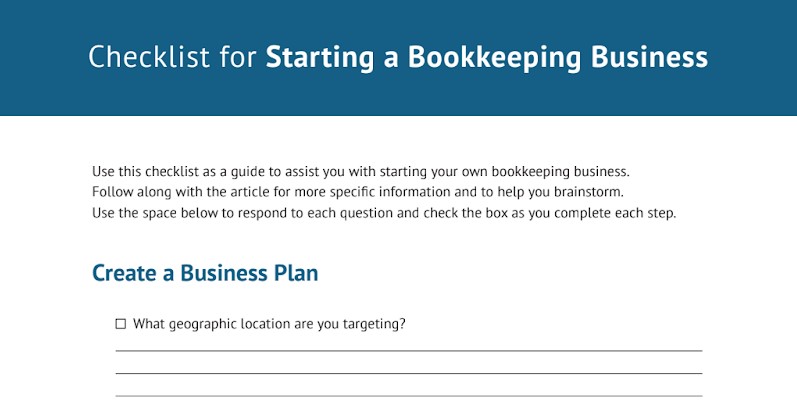
This article is part of a larger series on Accounting Software.
Table of Contents


Bookkeeping is a great home-based business that’s easy to start with very little cash. Whether you are looking to make extra money or want to grow a business to support you and your family, our guide on how to start a bookkeeping business will help you achieve your goal. We’ll walk you through the process, from creating a business plan and registering the business to getting the right software and marketing.
Download your free checklist for starting a bookkeeping business.
FILE TO DOWNLOAD OR INTEGRATE
Start a Bookkeeping Business Checklist
Download as Word Doc Download as Google Doc Download as PDF
Our related resources:
First, decide whether your target market will be limited to your surrounding area or if you’ll offer online services. While it’s tempting to offer your services online to a worldwide audience, it adds a lot of complexity to your operations. You should plan on paying for help with online advertising, web design, search engine optimization (SEO), and website content management.
The next decision is whether to focus on a particular small business niche or to offer services to all small businesses. It’s much easier to become an expert in accounting for a particular business niche than for all businesses in general.
The best niches to consider are those with unique bookkeeping challenges. For example:
While choosing a niche will greatly reduce your available client base, it makes it much easier to gain expertise and distinguish yourself from your competitors.
Choose What Services You’ll OfferYou should decide what services your bookkeeping business will initially offer. You might add more later, but knowing your initial offerings is important so that you can choose the right certifications and software.
Here are some of the common services offered by bookkeeping businesses:
Our related resources:
Define your service packages and pricing structure so that you can easily communicate this information to your clients. Create tiered service packages with increasing levels of complexity and features.
Here are some common options:
There are several pricing strategies. These include
It is important to set competitive rates by researching what other bookkeepers in your area charge for similar services. Factor in your experience, expertise, and the value you deliver to clients when setting your rates. For guidance, see our article on how much bookkeepers charge.
One of the fastest ways to gain credibility with potential clients is to prove that you have the knowledge necessary to do bookkeeping, payroll, and perhaps tax returns. If you’re a certified public accountant (CPA), you probably won’t benefit from becoming a certified bookkeeper, but you still might consider becoming certified in whatever accounting software you choose to use.
Certified BookkeeperEven if you don’t have formal education in accounting or bookkeeping, you can become a certified bookkeeper before starting your own bookkeeping business. Unlike CPAs, these certifications aren’t regulated by the state, so be sure to choose a large, reputable organization so that the certification is meaningful and respected.
There are two professional bookkeeper organizations that we recommend you certify with. There are also other opportunities to earn a bookkeeper specialization, such as through a university like UCLA.
This certification is ideal if you don’t have any formal education in the bookkeeping and accounting field. As an AIPB member, you’ll get access to personal help regarding bookkeeping and payroll, as well as membership discounts. Membership comes in three tiers, and a longer membership plan has added benefits compared to a shorter membership plan.
Once certified, you’ll earn the right to put the letters CB (stands for Certified Bookkeeper) behind your name and display this on your resume and business cards, which will give you an edge with potential clients.
You’ll also need one year of experience before applying for the license. If you’ve had college accounting courses, you might be able to substitute them for required courses, but you’ll still need to pass each exam.
Once certified, you’ll earn the credentials CPB (stands for Certified Professional Bookkeeper). You can put these letters after your name on resumes, business cards, and other materials to display your accomplishments to future clients.
If you maintain a GPA of 2.5 or higher in each course, you’ll receive a certificate upon completion. This option is best for experienced bookkeepers or individuals who are looking to make the transition to a career in bookkeeping or accounting.
Accounting Software CertificationSome of the best small business accounting software offer a certification program so that bookkeepers can demonstrate they’re proficient with the solution. Most of the certifications are free and even come with free accounting software for your firm.
Here are a few of the most popular accounting software and their certification programs:
The Online certification is free, but the Desktop certification requires the purchase of QuickBooks Desktop Accountant software, which starts at $499.99 per year.
It’s free to join, and there’s no cost to use the FreshBooks software for accounting professionals. FreshBooks offers a 30% discount for accountants and bookkeepers on the first six months of their clients’ paid subscription to FreshBooks.
The Zoho Books Consulting Partner program is free to join and gives you access to Zoho training resources and certifications. You’ll receive a dedicated account manager and free access to the Premium plan when you become a Zoho Advisor.
Tax CertificationNo certification is required for a paid preparer to sign a client’s tax return, but I highly recommend not preparing returns unless you’re a tax professional or willing to put in the work to become one. Many bookkeeping firms prepare financial statements that their clients take to CPAs or other tax pros to prepare a return. You may find yourself working closely with their tax preparer, and together, you can provide outstanding service to your mutual clients.
Avoid pitfalls! It’s illegal to prepare a client’s tax return and not sign it as the paid preparer. This means you cannot use DIY software, like TurboTax and TaxAct, to prepare client returns because they don’t allow for a paid-preparer signature. You’ll need a professional tax program instead, and you can check our guide to the best professional tax software to find one that fits the bill.
If you are not a CPA and want to prepare tax returns, I recommend becoming an Enrolled Agent (EA) through the IRS. EAs must initially pass an examination and then complete annual continuing education to renew their certification every three years. While no formal education or classes are required, the examinations are difficult and will prove you have the knowledge to serve tax clients properly.
Online Bookkeeping ClassesNon-accounting degree holders who would like to pursue a bookkeeping career can take bookkeeping courses online. It’s significantly shorter than a full accounting college course. We recommend choosing courses that provide a certificate so that you can include it on your resume.
You can sign up for online bookkeeping courses from the following providers:
Topics like basic bookkeeping, financial accounting, cost accounting, and financial management are covered. Learning tools include quizzes, flashcards, visual tutorials, and cheat sheets.
Coursera also curates lists of popular courses for beginners. These might include options from various providers alongside Intuit’s offerings.
You’ll find courses on topics like financial statements, journal entries, and analyzing transactions. The Accounting Foundations: Bookkeeping course allows you to earn continuing education units and a certificate upon completion.
This step is important because it establishes your business as legitimate and may help to limit your personal liability if your company is ever sued. Whether you’re doing this part-time or full-time, you don’t want to skip this step.
You need to do the following to establish your business at the local, state, and federal levels:
Step 3.1: Select a Business NameNaming your business can be both a fun and stressful exercise. Your name must convey your brand since that is what a potential customer will see before they sit down with you for that initial consultation. Ensure your business name says exactly what you do; this is not the time to be cute—unless you can also be clear about what it is that you do.
Here are some great tips on how to name your business:
There are four common business structures: sole proprietorship, partnership, limited liability company (LLC), and corporation. The structure that you choose will determine your personal liability if the company is ever sued, your tax liability, and your ability to raise capital.
To assist you with this decision, I recommend that you get an introduction to the four common business structures by reading our small business structure guide.
Most people operating a part-time bookkeeping business without employees will operate as a sole proprietorship, which works fine. However, if your business grows to the point of hiring employees, you need to consider becoming an LLC or corporation.
In addition to tax consequences, your personal liability in the event of a lawsuit can vary dramatically by business structure, so be sure to consult with an attorney.
Step 3.3: Apply for an EINBefore your business begins operating, it is important to get an employer identification number (EIN), a unique nine-digit number that identifies your business. You’ll obtain an EIN from the IRS to identify your business for tax purposes.
This is also typically required to open a business bank account or apply for a business loan. There is no cost to obtain an EIN, and the process involves filling out an application and sending it via mail, fax, or online.
Step 3.4: Register Your BusinessOnce you have received your EIN and have chosen a business structure, it’s now time to register your business with your state. Our guide on how to register a business gives more detailed information and a checklist, but it will involve either doing it yourself through the state’s website or using an online legal service. If you prefer the latter, we recommend that you visit LegalZoom.
It is also a good idea to choose a registered agent, or someone who you choose to represent your business and who will serve as the point of contact if there are legal actions against your business.
Now that you’ve organized your business, you can start setting up operations. For instance, you’ll want to check out one of the best small business insurance companies.
Set Up a Business Telephone NumberGetting a unique phone number for your business is incredibly easy and often free. You can get a free Google Voice number, which includes a local area code, voicemail, texts, and unlimited calling. You can learn more through our guide on VoIP phone systems.
Hire an Answering ServiceAs a one-person operation, you may find it hard to get back to clients right away, especially during tax season. Sending prospective customers to voicemail when they need your services can cost you business. For our recommendations, see our top-recommended answering services.
Set Up a Business Bank AccountIt’s important to separate your business and personal finances. While most think they should wait until the business starts to generate cash flow, it’s important to track expenses immediately so that they can be deducted as startup costs. Our list of the leading small business checking accounts will help you find a provider that fits the bill.
You can refer to our guide on how to open a business bank account. It includes a checklist of required documents per entity type.
Establish a Business Mailing AddressIf you plan to lease office space, then your mailing address will be wherever your office is located. However, if you plan to set up a home office, you’ll need to obtain a business mailing address so that you don’t have to use your home address. This will make your business appear more professional and maintain your privacy.
There are a couple of options.
As a bookkeeper, you should have liability protection in case you get sued for a mistake on your client’s books. Insurance can cover both the cost of settling a lawsuit and the lawyer fees to defend against a lawsuit.
For more information on the right insurance coverage, check out our article on CPA & Accounting Insurance. It covers costs, coverages, and the leading insurers.
Determining which software to use to manage all of the various aspects of your business can be an overwhelming task. To get you started, the following is a list of the areas of your business for which you’ll need to decide which software tool to use:
Client SoftwareYou need to decide what accounting program you would like your clients to use. This doesn’t necessarily have to be the same platform that you use to manage your bookkeeping business.
A few things to consider when selecting software to recommend to your clients are:
You’ll also need to choose a bookkeeping software for your bookkeeping business. Some accounting solutions offer a bookkeeper or accountant edition specifically designed for bookkeeping companies to use both for their books and as a portal to their client’s books.
My recommendation is that you use QuickBooks Online, which we rated as the overall best small business accounting software. You can get QuickBooks Online Accountant for free when you join the QuickBooks Online ProAdvisor program, which is also free.
Check out our guide on how to become a QuickBooks ProAdvisor. Payroll Software or ProviderDepending on the bookkeeping/accounting software you choose, there generally will be a payroll processing option you can turn on when you’re ready to hire employees. If you decide to go with QuickBooks, it offers a variety of payroll options from which to choose. You can learn more about the solution in our in-depth QuickBooks Payroll review.
If you don’t want the headache of dealing with payroll, check out our guide on the leading payroll services for small businesses.
Practice Management SoftwareAnother tool that will make your life easier is practice management software. This can help you organize and track the progress of client work and, in some cases, provide a portal to access your client’s books. QuickBooks and Xero offer the best accounting practice management software that’s integrated with their accountant software.
Electronic File Sharing/ManagementA document-sharing program will allow you to share information—such as bank statements, copies of receipts, invoices, and accounting files—with your clients no matter where you’re working. Dropbox is a popular document-sharing program to consider.
You can create a Dropbox for each client, and they can start submitting their information. This system is much more secure than sending files via email or flash drive. To access the information in the document-sharing program, you need a user ID and password. And more importantly, there’s no need for physical backup because files are in the cloud.
After completing your business plan, you’ll have a good idea of what your estimated costs will be. In general, the startup costs for a bookkeeping business can be low if you work out of a home office as opposed to leasing office space, which we’ll discuss in the next section.
Experts say that you should always have at least six months’ worth of expenses in the bank. Also, even though your business is brand new and hasn’t generated any revenue, you may still qualify for business financing.
You’ll also want to open a business credit card account soon. It will likely be the first form of financing you’ll qualify for and can be a great financial tool to help you with cash flow or necessary expenses early on in your business. It can also be a great way to track your business expenses easily—this will go a long way toward making tax time a breeze. New bookkeeping businesses will typically use a credit card to float working capital expenses, earn rewards, and manage employees.
Our related resources:
When starting out, keep your costs low by setting up a home office. If possible, plan to meet your clients at their offices or virtually. I don’t recommend inviting clients to your home office unless you know them very well and have a private room where you can work.
Read our home office setup ideas to learn about the must-haves and productivity hacks.Also, don’t forget to take the home office tax deduction. You can deduct repairs and maintenance to the area used for business and a portion of utilities, real estate taxes, and insurance on your home.
If you can’t make a home office work, look into the top virtual office companies or office sharing. Typically, these spaces include a mailing address, a local telephone number, a receptionist to answer calls, a physical office space, and access to a conference room that you can rent by the hour.
Marketing is one of the most difficult things for accountants and bookkeepers to master. Whether this is your side gig or full-time business, you can get a website customized for your business with a company that offers specialized marketing services.
Our related resources:
In addition to a website, there are many ways to market your bookkeeping business:
Read our guide on how to get bookkeeping clients to learn how to implement these marketing ideas, plus find out more ways that you can market your bookkeeping business.
It’s tough to stay on top of new trends and changes in the industry. For example, one of the most popular trends in the software industry is that installed desktop software is becoming a thing of the past and is being replaced with subscription-based cloud software, also known as software-as-a-service (SaaS). This is a trend that’s changing how bookkeepers and accountants do business, so you must understand how it works since it’ll have a direct impact on your business.
Here’s how you can “stay in the loop” on what’s going on in the bookkeeping/accounting industry.
Investing the time to attend a conference will give you those continuing education credits you need to keep your bookkeeper or CPA certification. It’ll also enable you to learn what the hottest trends in the industry are and what’s becoming obsolete.
A great conference to attend is Intuit Connect. In 2024, the conference will take place in Las Vegas from October 28 to 30.
You may be surprised by how much valuable information you can get from monthly blogs and newsletters. You may not want to sign up for every accounting/bookkeeping blog that you come across, but here are a few worth checking out:
You should be a member of at least one professional bookkeeper association, and the AIPB and the NACPB are the top two. Professional associations often promote or host seminars and training. Sometimes, members can get discounted rates on these events as membership perks. Being part of these associations can also help you build your network with other bookkeepers, CPAs, and tax experts.
Because of the relatively low overhead costs, bookkeeping businesses can be profitable if they have a steady flow of clients and can manage their expenses effectively. The profitability of the business also depends on its size, the number of clients, the level of competition in the market, and the pricing strategy.
Do you need a license to become a self-employed bookkeeper?No, bookkeepers don’t need any licenses or certifications—unlike other finance professionals, such as accountants and financial planners. Some bookkeepers may decide to earn optional credentials, such as the certified public bookkeeper (CPB) designation.
How much should I charge as a bookkeeper?To determine how much to charge as a bookkeeper, it’s important to first evaluate your level of experience, your location, the services you offer, the frequency and complexity of the work, and whether you want to charge an hourly or fixed rate for your services. See our guide on How Much Bookkeepers Charge for an up-to-date review of bookkeeping rates by state.
What does a bookkeeper do?A bookkeeper is responsible for maintaining a company’s financial records, including recording financial transactions, reconciling accounts, paying bills and issuing invoices to clients, generating financial reports, and monitoring cash flow. They may also assist with the preparation of tax returns and other regulatory filings. The specific tasks and responsibilities of a bookkeeper may vary depending on the company they work for and the nature of their role.
Can you run a bookkeeping business from home?Yes, running a bookkeeping business from home is a great option for many entrepreneurs. It offers several advantages, including lower overhead costs, flexibility with scheduling, and overall convenience.
Now that we’ve provided you with a roadmap to get your bookkeeping business started, I want to challenge you to pick a date for when you would like to be ready to take that first client. Then, take this guide and create a weekly to-do list based on the steps we have shared with you.
Find Danielle On LinkedIn
Danielle Bauter is a writer for the Accounting division of Fit Small Business. She has owned Check Yourself, a bookkeeping and payroll service that specializes in small business, for over twenty years. She holds a Bachelor's degree from UCLA and has served on the Board of the National Association of Women Business Owners. She also regularly writes about business for various consumer publications.